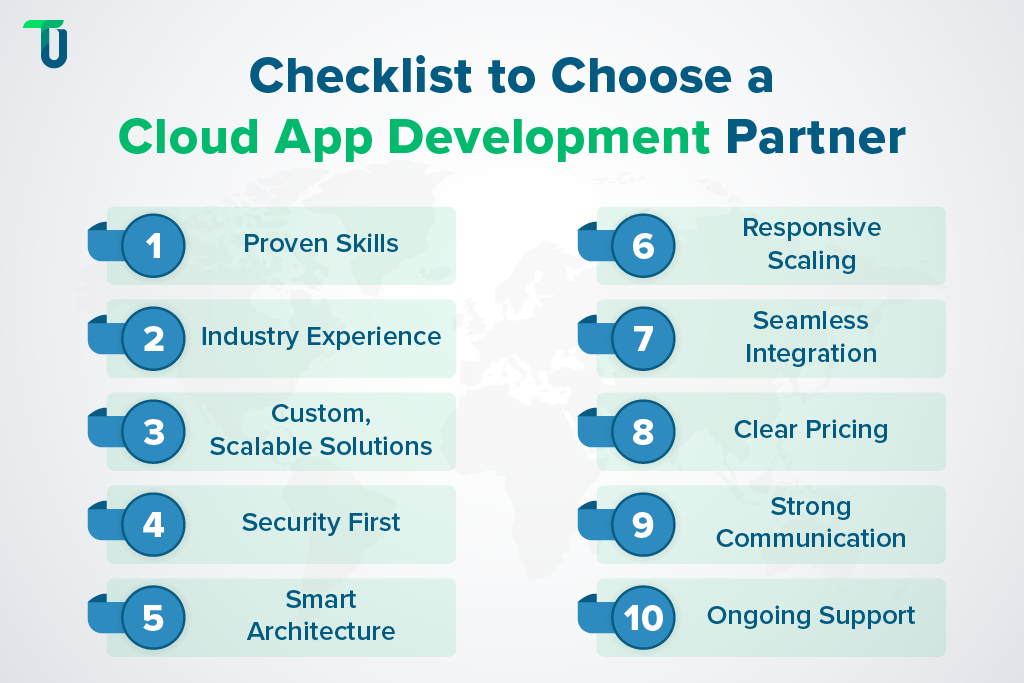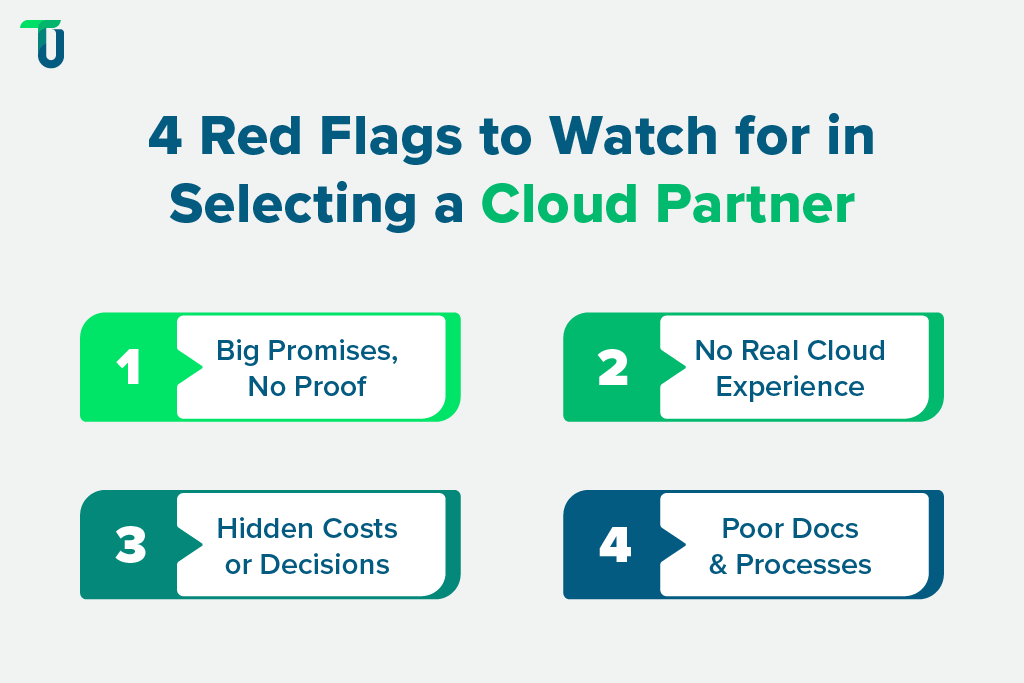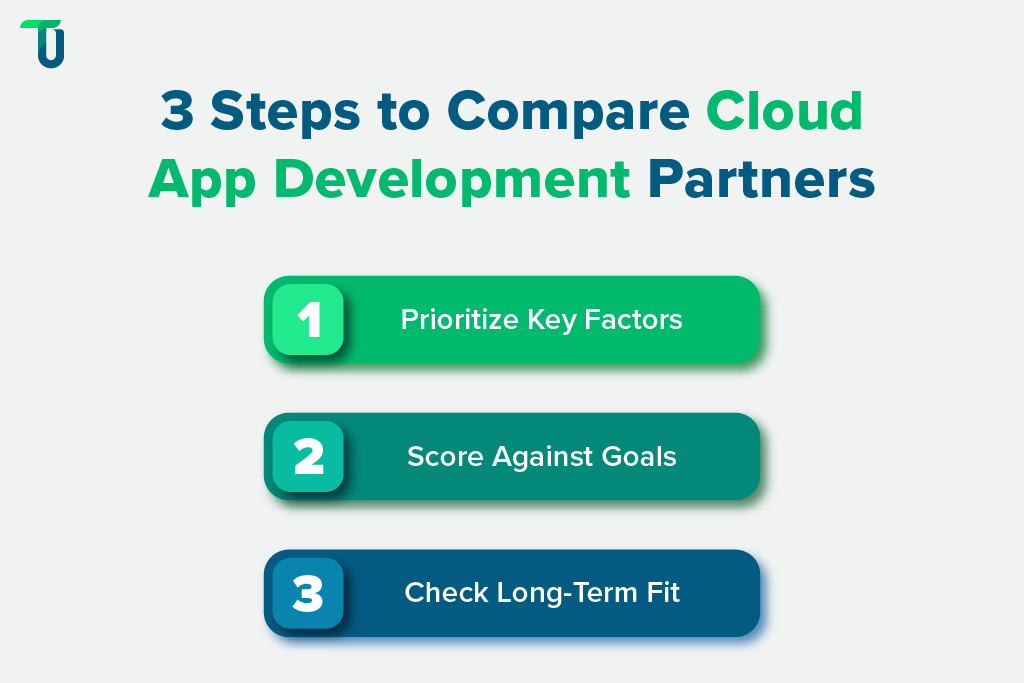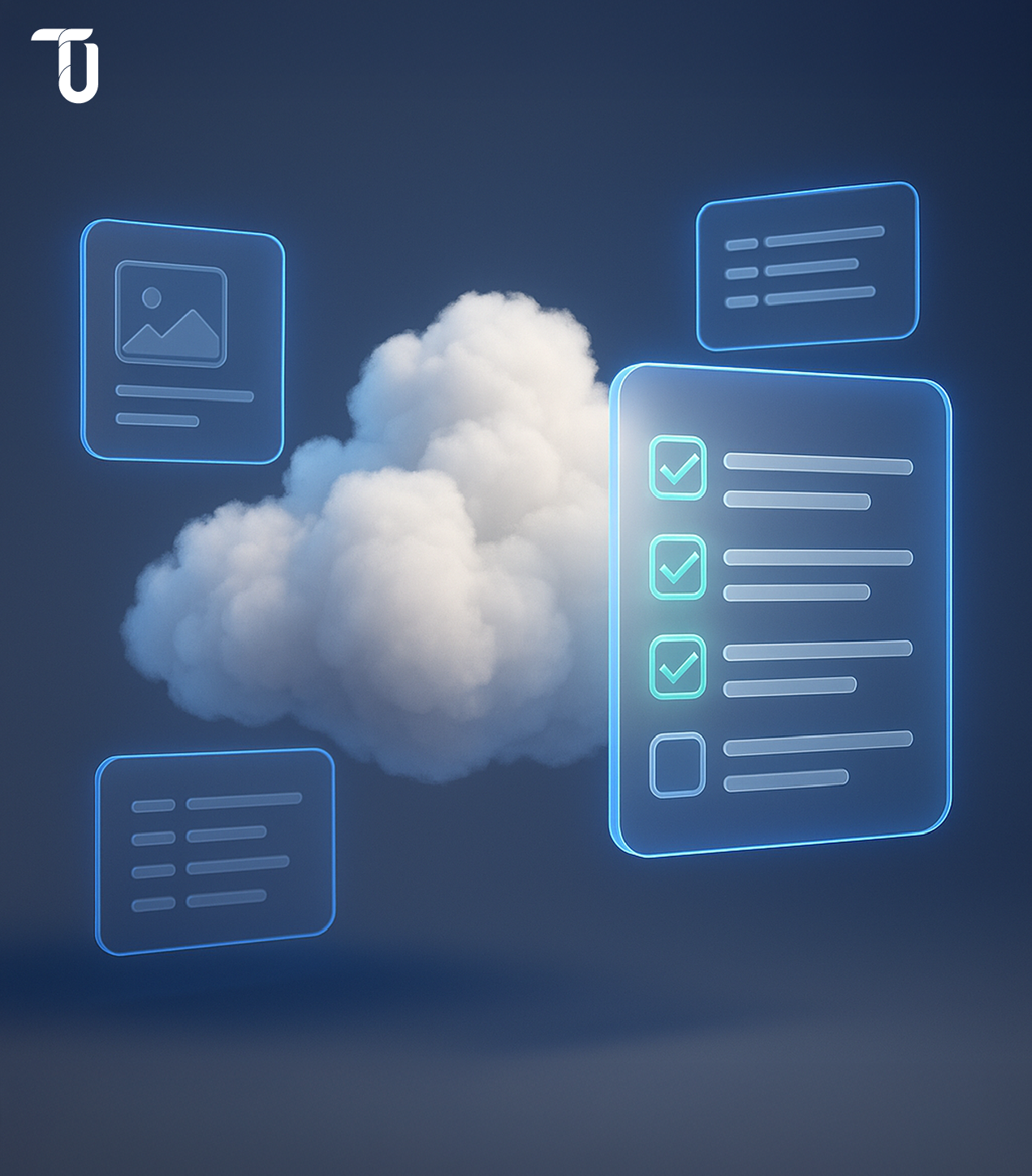Why Does the Right Cloud Application Development Service Partner Matter?
Choosing the right partner to deliver cloud application development services shapes your platform’s scalability, security, and ability to innovate. A partner with proven experience helps you grow smoothly as demand changes.
On the other hand, if you pick the wrong vendor you risk vendor lock‑in, unexpected downtime, or hidden limitations in customization. That limits future options and drives up your costs. For a CTO or tech leader, the decision is strategic. For all these reasons, you must align with a partner that supports cloud application development tailored to your needs, ensures resilience under stress, and enables new features without compromise.
Key Evaluation Checklist for CTOs
Choosing the right cloud application development partner takes more than just cost checks. Here's a detailed checklist every CTO should follow to ensure strong delivery, scalability, security, and long-term success.

1. Technical Expertise and Certifications
Before anything else, check if the partner truly understands cloud systems. They must know how to use tools like Docker, Kubernetes, and Terraform. These are not just fancy tools but the foundation of strong cloud application development.
Here are a few key areas where your cloud development partner must show proven expertise.
- Certified in AWS, Azure, or Google Cloud
- Experienced in DevOps and automation tools
- Familiar with hybrid and cloud-native systems
- Skilled in setting up CI/CD and scalable deployments
Choose a partner with strong technical roots. This gives your cloud application the solid structure it needs to grow confidently and stay future-ready.
2. Industry Experience and Past Projects
Every industry has different needs, and your partner must understand yours well. Look at their past work. Ask for real examples from businesses similar to yours. This helps you see how they manage industry-specific challenges. If they have built apps for regulated sectors like finance or healthcare, that’s a good sign.
You should also speak with past clients if possible. Honest feedback gives insight into how the partner works during a project. Knowing they have delivered quality cloud application development services before is a big plus.
Experience matters. It shows they can handle pressure, tight timelines, and meet expectations with confidence.
3. Customization and Scalability
Your business is unique. That means your app needs custom cloud application development, not a copy of someone else’s. A good partner listens to your needs, then builds solutions around them. They also design systems that can grow with your business, not break under pressure. Here are some major capabilities to look for:
- Provides solutions tailored to your business needs
- Uses microservices to allow faster development
- Supports apps that run smoothly under more traffic
- Builds systems that adapt to future tools and growth
4. Security and Compliance Measures
Security is not just about passwords. It involves every part of your app, from how users log in to how data travels. Your cloud partner must understand security rules like GDPR, HIPAA, or SOC2. These are often required by law in many industries.
They must use strong data encryption, control who has access, and review their code for risks. They should also include security checks in every update.
A partner who includes safety in their cloud application development services helps you avoid data breaches, fines, and loss of trust. That makes your app more dependable for users and clients.
5. Cloud Strategy and Architecture Planning
You don’t just need an app. You need a plan that makes sure it lasts, performs well, and costs less in the long run. A reliable partner will help you plan your move to the cloud, one step at a time. They will also help you modernize old systems if needed.
Look for the below strategic strengths to make sure your cloud application is built for the long haul:
- Offers help with full migration planning
- Designs apps that reduce cost and effort
- Uses tools that simplify app maintenance
- Avoids vendor lock-in with flexible designs
This approach ensures your cloud application development stays on track for long-term success. The right strategy protects your time, budget, and resources.
6. Best Practices for Responsiveness in Cloud Scaling
One often overlooked aspect of cloud architecture is how responsive your system is when scaling up or down. The best cloud application development services implement best practices for responsiveness in cloud scaling, ensuring that your infrastructure reacts quickly to demand changes without delays or downtime. Refer to our CTO's checklist for evaluating cloud application development services to ensure your partner follows these principles effectively.
This includes using auto-scaling groups, load balancing strategies, and performance monitoring to trigger scaling events in real time. Partners who embed these practices into the architecture can help you achieve consistent performance even during traffic spikes, ensuring that users always get a seamless experience, no matter the load.
7. Integration Capabilities
Your new cloud app must connect well with what you already use. That includes CRMs, ERPs, payment systems, or other software. A skilled team knows how to build integrations that pass data between systems without errors.
They must use APIs and proper security methods to keep connections safe. They should also check how the app will behave when other systems change.
If your app can’t talk to the rest of your setup, you may end up with silos. Choose cloud application development services that build strong bridges, not isolated tools.
8. Cost Transparency and Budget Alignment
Many projects fail because of unexpected costs. You need a partner who talks openly about money from the start. They must give you clear estimates and explain all parts of the budget. This includes costs for building, maintaining, and upgrading your cloud app.
Here are the main cost-related factors you should confirm before moving forward with any provider.
- Offers clear and simple pricing models
- Shares full cost breakdown upfront
- Helps you plan for long-term expenses
- Warns about areas where costs may rise
Choosing transparent cloud application development services gives you control. You stay within budget and avoid surprise expenses during or after the project.
9. Communication and Project Management
Strong communication leads to smooth projects. Your cloud partner should talk clearly, respond fast, and share regular updates. They should use project tools that show progress and allow feedback.
A dedicated project manager helps keep things organized. They follow timelines, alert you about any delays, and find solutions quickly.
Good cloud application development services include regular check-ins, updates, and honest conversations. That keeps you involved and confident at every stage.
10. Support and Post-Deployment Maintenance
The real test begins after your app goes live. You need someone who stays with you during that phase. A strong partner offers round-the-clock support. They also fix bugs, apply updates, and suggest improvements.
Check if your cloud application development partner offers the following ongoing support essentials.
- Available 24/7 to solve urgent issues
- Offers SLAs with clear terms and timelines
- Maintains and updates your app regularly
- Helps with adding features in the future
Reliable support makes sure your app stays healthy. With the right help, your app performs better, avoids downtime, and stays secure long after the launch.
TenUp’s Take: Beyond capabilities and pricing, assess a provider's approach to observability, incident response, and system resilience. Mature cloud application development partners embed monitoring, automated alerts, and chaos testing to ensure uptime and performance under real-world loads.
Need end-to-end cloud application development?
Get full cycle cloud application development services from design to deployment with reliable support aligned to your business goals with TenUp.
What to Watch Out for When Vetting Cloud Service Providers
Choosing the wrong partner for cloud application development can lead to delays and failure. Watch for these warning signs early to avoid poor results, wasted budget, and unstable systems.

1. Overpromising and Under-Delivering
If a provider promises too much but cannot show proof, step back. In cloud application development, false claims lead to delays, poor quality, or missed goals. Choose a team that sets realistic expectations and delivers results with a clear process.
2. Lack of Cloud-Specific Experience or Reused Legacy Models
Some vendors rely on outdated practices or reuse old code. This slows down projects and blocks growth. For reliable cloud application development services, choose partners with real experience in cloud-native projects, not just traditional software development.
3. Resistance to Transparency in Pricing or Architecture Decisions
Avoid teams that avoid sharing pricing details or design choices. In custom cloud application development, clear costs and open discussions matter. A partner who hides key decisions may later add hidden costs or deliver mismatched solutions.
4. Inadequate Documentation or Unclear DevOps Processes
Poor documentation leads to confusion, bugs, and slow updates. If the partner lacks clear DevOps steps or skips records, future teams cannot manage the app easily. Quality cloud application development depends on clear plans, version control, and traceable changes. Spotting these red flags helps you choose the right cloud application development services. Stay alert, ask tough questions, and only trust partners who show real experience and clear communication.
Related Blogs You’ll Love
Key Questions CTOs Should Ask Cloud Application Development Partners
In addition to checking skills and past work, CTOs must ask clear questions before choosing cloud application development services. Here are some questions that help uncover real capabilities and risks:
- How do you ensure scalability and performance across cloud environments?
- Can you share a recent example of custom cloud application development for a multi-cloud setup?
- What is your disaster recovery and backup approach across cloud platforms?
- How do you manage CI/CD pipelines, DevOps workflows, and automated testing?
- Which cloud security standards and compliance frameworks do you follow?
- How do you handle post-deployment monitoring, updates, and support?
- What level of access and transparency do you provide during development?
These questions will help you understand the provider’s actual capabilities, technical depth, and long-term fit for your cloud application development needs.
How to Compare Shortlisted Cloud Application Development Partners
Once you have a list of potential cloud application development partners, the next step is a clear comparison. A weighted scorecard helps you stay objective and make a smart decision.

Define and prioritize key factors
Focus on relevant areas such as custom cloud application development experience, flexibility in cloud application development services, project cost, support quality, and scalability. Assign weights based on your current product stage.
Score each provider against real needs
Rate each partner for how well they meet your goals. Use consistent criteria to evaluate technical expertise, clarity in communication, and delivery timelines across the board.
Assess long-term alignment
Go beyond immediate tasks. Review how each partner supports future changes, scales your product, and maintains reliability over time. Long-term compatibility matters more than short-term wins.
By using a fair and structured scorecard, you reduce risk and find a team that matches both your current needs and future plans. Above all, don’t settle for the lowest quote. Rather, go for the best value.
TenUp: Your Trusted Partner in Custom Cloud Application Development
Based on everything shared above, one thing is clear– choosing the right cloud application development services provider is a strategic decision. As a CTO, your goal should not just be delivery but long-term value.
The cheapest offer might save money upfront, but can lead to hidden costs, poor scalability, or technical debt. Instead, focus on finding a partner who aligns with your business goals, brings proven cloud expertise, and supports continuous innovation.
This is where we, TenUp, come into the picture. As a leading name in custom cloud application development, we bring years of experience in delivering reliable cloud application development services. From multi-cloud architecture and CI/CD to performance optimization and long-term support, we cover the entire spectrum.
If you’re serious about long-term success, let TenUp be your ultimate custom cloud application development partner. Get in touch with our experts today!
Simplify Complex Cloud Projects with TenUp
Handle complex cloud application development easily with TenUp’s custom solutions, expert team, and long-term support.
Frequently asked questions
What should a cloud application development service include beyond basic deployment?
A modern cloud application development service should go beyond deployment by offering scalable cloud-native architecture, CI/CD automation, built-in security, real-time monitoring, multi-tenancy support, and DevOps integration. It should also include API-first design, microservices, auto-scaling, disaster recovery, and cost optimization, ensuring performance, reliability, and long-term maintainability.
How do I compare cloud development partners offering similar tech stacks?
Don’t just compare certifications—evaluate partners based on their ability to scale, pricing transparency, SLAs, post-launch support, and proven success in real-world projects. Look for teams that demonstrate reliability, communication clarity, and long-term alignment, not just tech stack familiarity.
How do cloud development services help avoid vendor lock-in?
Leading cloud development services prevent vendor lock-in by using open standards, containerization, and platform-agnostic tools like Kubernetes and Terraform. They also enable multi-cloud or hybrid strategies, giving you the flexibility to switch providers without rewriting your application or losing control of your data.
Can a cloud development service reduce my cloud costs in the long term?
Yes. A cloud development service reduces long-term costs by optimizing infrastructure, automating scaling, preventing overprovisioning, and integrating cost monitoring into DevOps workflows, lowering total cost of ownership (TCO) while improving performance and budget predictability.
What makes a cloud development partner reliable for enterprise-scale apps?
A reliable cloud partner for enterprise-scale apps brings deep experience in distributed systems, high availability architecture, disaster recovery, and scalable microservices. They also ensure security, regulatory compliance, and consistent delivery under complex, mission-critical workloads.
When should a startup choose custom cloud application development over off-the-shelf SaaS?
Startups should go custom when scalability, data control, complex integrations, or unique workflows outweigh the quick launch of SaaS. Custom development offers long-term flexibility, avoids vendor lock-in, and supports growth that standard SaaS can’t adapt to.

